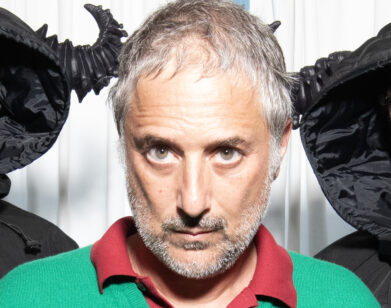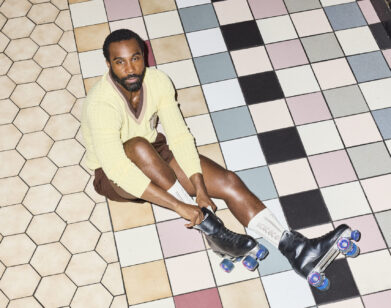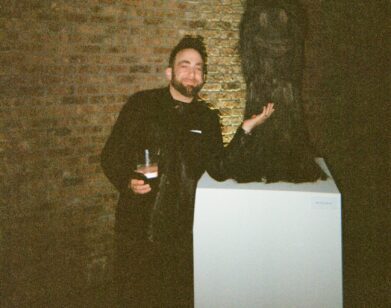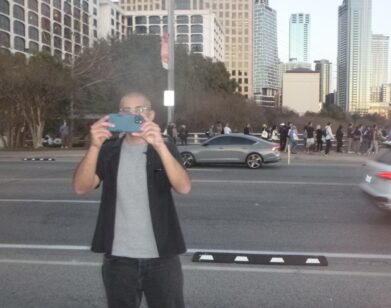The Fruit of David Michôd’s Despair
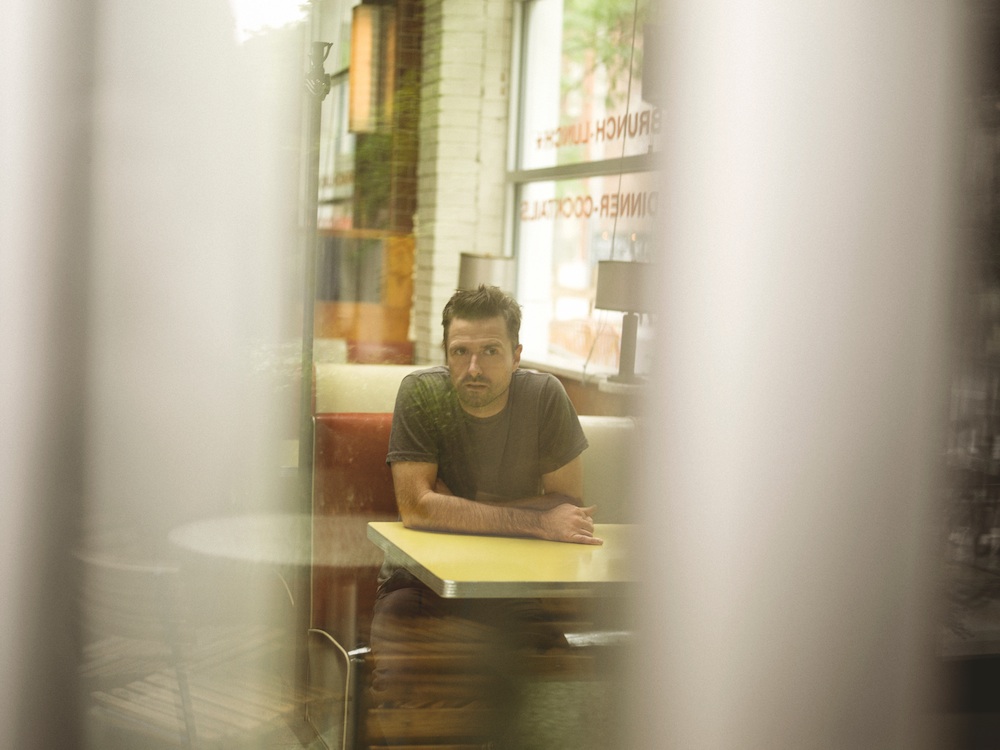
ABOVE: DAVID MICHÔD AT B BAR & GRILL IN NEW YORK, MAY 2014. PHOTO BY CHRISTOPHER GABELLO.
“I have no idea what people expected my second movie to be like,” announces Australian writer-director David Michôd at a New York screening of The Rover, “but this is it.” Michôd’s follow-up to 2010’s Oscar-nominated Animal Kingdom, The Rover does not come from a happy place. Set 10 years after “the collapse,” a vague upheaval of western economy and culture, The Rover shows rural Australia as a desolate, dusty, forgotten wasteland. The only inhabitants are a handful of society’s most easily overlooked—old men clutching guns, drug dealers, murderers, pimps, prostitutes, immigrants fleeing from an even greater destruction—and a paltry military police force.
“I wrote the first draft in 2007 and then in 2008, the financial crisis happened,” Michôd explains the next day. “I started imagining where we were headed, finding myself filled with a kind of strange despair, which then, on occasion, would retake into anger,” he continues.
Despair permeates The Rover: The film opens with Guy Pearce sitting in a nondescript car. He is disheveled and dirty; his face defined by wrinkles and sun freckles, and flecks of grey in his beard. When he exits the car, one shoulder slumps down and he walks with a limp. He crosses the road to drink in a small shack and three criminals steal his car. He chases them down unsuccessfully. One of the criminals, Henry (played by Scoot McNairy), is an American, with a younger brother, Rey (Robert Pattinson), left for dead at their previous destination.
Although, when the credits appear, Guy Pearce’s character is listed as “Eric,” he is never once addressed by this name in the film. Everyone he meets is a stranger, and he is referred to as “mate,” “sweetheart,” “my baby,” and “cunt.” Eric and Rey form an unlikely partnership to track down Henry and the car. Rey is looking for friendship, kindness—any sort of anchor to the world. Eric is too far gone to be looking for anything.
Co-written and produced by Michôd’s close friend actor Joel Edgerton, The Rover debuted last month at Cannes.
EMMA BROWN: Guy Pearce’s character poses a question in the film: “What feeling do you get in the morning when your feet touch the floor?” So, I was wondering, what feeling do you get in the morning when your feet touch the floor?
DAVID MICHÔD: [laughs]
BROWN: Is this the eighth time you’ve been asked this today?
MICHÔD: No. Surprisingly, no. This is kind of at the core of the whole movie. In the space of—I’ve managed to condense it down to just fractions of seconds—but I go from, “What is the point of this whole thing?” to, “The only reason to get out of bed in the morning is to form meaningful connections with other human beings.” Which is what the movie is about.
BROWN: Do you have any brothers?
MICHÔD: Two younger ones.
BROWN: The fraternal relationships in both Animal Kingdom and The Rover are a bit dysfunctional. Do your brothers ever worry about what they’ve inspired in you?
MICHÔD: No. They don’t. My mother’s asked that question a few times. [laughs] Especially after Animal Kingdom, I felt like I needed to make clear to people quite regularly that I had a perfectly functional home life; a perfectly functional family life. I have no idea why I’m attracted to these dark and dysfunctional relationships in the movies.
BROWN: Guy Pearce is also in your first film, Animal Kingdom. Did you know him before that film?
MICHÔD: No. That was one of the things that was really reassuring for me when I was trying to put that movie together. It being a first movie, I needed those little affirmations from people that this was a thing that was worth doing at all. A lot of the actors in the film I already knew. Guy was the most famous and his enthusiastic and early response to the script was really encouraging for me. We ended up shooting the movie about a year after he became attached and his willingness—eagerness—to stay involved and make it work I always found very encouraging. He would be reading a lot of stuff and saying no to a lot of things.
BROWN: Did you think Guy would accept your offer when you brought Animal Kingdom to him, or did it feel like a total pipe dream?
MICHÔD: I just didn’t know. I didn’t know what was going to happen. You throw those things out into the ether—because he was my first choice, it wasn’t like I’d already had nine rejections and finally landed on Guy. I didn’t know how the script was going to land in the world.
BROWN: With The Rover, did you start with the idea of Guy’s character or the collapse? What was the initial seed?
MIMICHÔD: The character. It was more just a kind of idea or a type of movie. I remember Joel Edgerton and I started talking about it in 2007 when we were in L.A. Joel and I were at relative loose ends—I think my ends were looser than his; I didn’t really know why I was there. I hadn’t yet made any of the shorts that got me some attention, and I certainly hadn’t made Animal Kingdom. We started talking about a story that we imagined one day his brother would direct. Given his brother’s cinematic proclivities, we thought that this movie would be a car chase movie in the desert. We spent about 10 days working a story out that revolved around, at its origin, a guy who had his car stolen and spent the rest of the movie trying to get it back. I went away to write this first draft and then very quickly and unsurprisingly started writing a movie that I would want to make, which doesn’t have a whole lot of car chases in it. That’s where it began. The nature of the collapse and the world was stuff that found it’s way into the script after I’d made Animal Kingdom. So much of it was about my feelings of despair about where the world was heading, in a way that I’d never felt before. Maybe it was a product of me getting older, but I’d always had this sense that, no matter what the world was like today, there was always great potential for it to get better. Sometime after the financial crisis— seeing the ways in which sociopathic men were given a license to just destroy western economies coupled with our seeming complete intransigence with regard to the issue of environmental degradation—I just started to think, “What will become of us.”
BROWN: Given where the film was coming from it’s interesting that you picked the U.S. dollar as the currency that survives in The Rover—the one that everyone wants.
MICHÔD: Yeah, it’s almost entirely meaningless and arbitrary that people cling to these almost arcane symbols of a collapsed empire.
BROWN: I know that you had certain musical references in mind before you started filming, and that you gave the cast music to listen to. Did you have a visual reference in mind?
MICHÔD: No. Musical references come to me more easily and more usefully than visual ones. That stuff always comes later. It comes when I’m in pre-production and I’m actually having specific discussions with a cinematographer or a production designer. That’s when we start looking at photographs and start looking at reference materials. But when I’m trying to communicate just the world of a movie or a tone to the people who will be my key collaborators, music, for me, is always the most immediate and emotional way of doing it.
BROWN: Rob Pattinson’s character Rey sings a Keri Hilson song in the film. When did you decide on that particular song?
MICHÔD: Initially, it was just a song like that. For me, the purpose of that song in the movie was just to, at a particularly dark and poignant juncture, remind the audience that Rob is a kid who, in different circumstances, might have had regular post-adolescent aspirations. Whose interests would have been firmly rooted in girls and music. I don’t really remember why that song appealed to me so much other than it’s a guilty pleasure.
BROWN: Can you still listen to it?
MICHÔD: Yeah, I can. I don’t know how much of it there is in the movie, but I couldn’t tell you how it ends anymore. I’ve listened to the first minute and a half of it so many times that I couldn’t tell you what the last minute and a half sounds like.
BROWN: There is the saying that you make a movie three times: when you’re writing, when you’re filming, and when you’re editing. Do you feel like that’s true?
MICHÔD: I reckon you make it four times.
BROWN: When is the fourth time?
MICHÔD: This is it right now. I hear frequently about filmmakers who don’t want to talk about the movies, they want the movies to speak for themselves. But for me, this is a really important part of the process. So much of what you do when you’re making a movie is intuitive and emotional. This part of the process, for me, is when you actually start picking it apart. I can take a step away from it and start unpicking it almost as if I hadn’t made it myself. I really love this part, as terrifying as it is, because this is the part of the process when I start finding out what it is and how it sits in the world. It’s also the bit where my understanding of it becomes as close to complete it will ever be.
BROWN: Was there anything that, once you could take a step back, surprised you about the film—something you didn’t realize you had focused on?
MICHÔD: The depth of the anger and despair surprised me at a certain point. When I started having conversations with Guy about the character I had asked him to play; on the page, the character was very lean. He’s a taciturn character. Then in talking to Guy about it, and to unpick it in a way that he could understand and then play, it became apparent that what we were contemplating was really quite a monstrous creature. I don’t know that he had fully anticipated that when he first became involved. I don’t know that I fully anticipated how monstrous this creature was.
BROWN: Why did you choose to give Guy Pearce’s character a name when it is never mentioned in the film?
MICHÔD: We talked about this at one point—do we just call him “the man” or something. In all the conversations about him, I wanted him to have a name because I wanted him to be a regular man for whom things had gone horribly wrong. I wanted to give—no offense to all the Erics in the world—but I wanted to his name to be entirely unexceptional. I should have just called him David.
THE ROVER OPENS TODAY, JUNE 13, IN NEW YORK AND L.A. AND NEXT FRIDAY, JUNE 20, IN SELECT CINEMAS NATIONWIDE.


